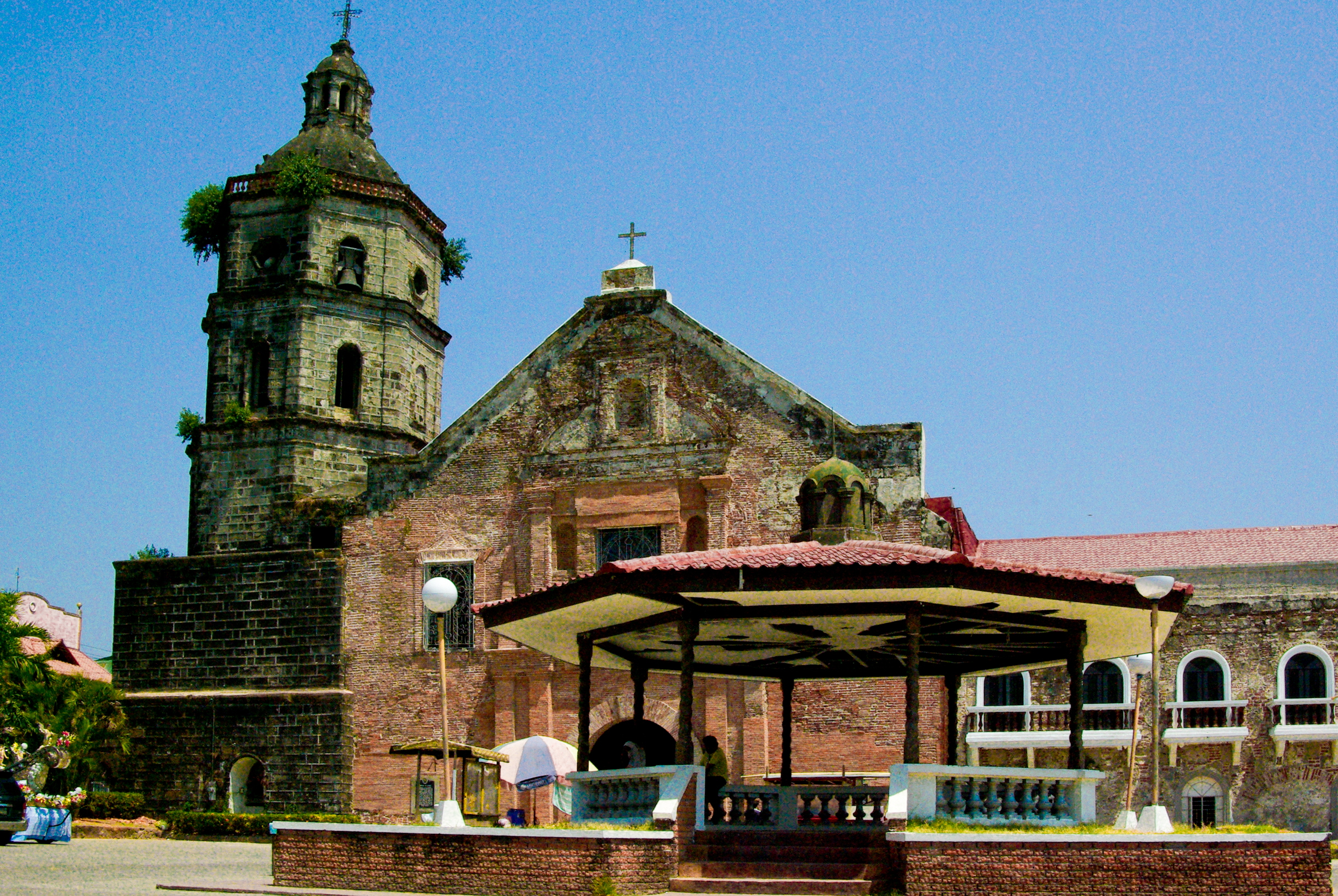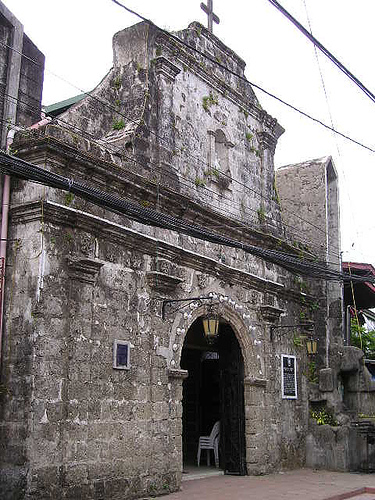|
Jaime De La Rosa
Tomás Lim de la Rosa (September 18, 1921 – December 2, 1992), also known for his screen name Jaime de la Rosa was a Filipino prewar and postwar actor and politician. Early life Tomás de la Rosa was the first screen name he used, later changing it to Jaime. Born in Lubao, Pampanga on September 18, 1921. Personal life He is the younger brother of Rogelio dela Rosa and became one of LVN Pictures's bankable stars. He was married to Beatriz S. Dela Rosa (December 5, 1922 – September 18, 2000). He has Spanish and Chinese ancestry. Death De la Rosa died on December 2, 1992. He was buried in Loyola Memorial Park in Marikina Filmography *1940 -Cadena de amor - Sanggumay Pictures *1940 -Bawal na Pag-ibig - Parlatone Hispano-Filipino *1940 -Kahapon Lamang - Sampaguita Pictures Sampaguita Pictures was a Philippine film production company. It was named for the Philippine national flower, sampaguita. Though no longer functioning, the company's Sampaguita Compound remains in Quezon ... [...More Info...] [...Related Items...] OR: [Wikipedia] [Google] [Baidu] |
Lubao, Pampanga
Lubao, officially the Municipality of Lubao ( pam, Balen ning Lubao; fil, Bayan ng Lubao), is a 1st class municipality in the province of Pampanga, Philippines. According to the 2020 census, it has a population of 173,502 people. It is noted for rice, sugar cane, fish, and sampaguita. Etymology The town's name derives from the indigenous term ''lubo'' which means low or sunken, reflective of the area's muddy and flooded characteristics. Lubao is also known by its Kapampangan language equivalent Baba. Geography Located in the south-western part of Pampanga, Lubao is bounded by the municipalities of Sasmuan on the east, Guagua on the north-east, Floridablanca on the north and Hermosa, Bataan, on the south. Lubao is from San Fernando, from Angeles, and from Manila. Barangays Lubao is politically subdivided into 44 barangays. Cluster 1: * San Isidro * Santiago * Santo Niño (Prado Saba) * San Roque Arbol * Baruya (San Rafael) * Lourdes (Lauc Pau) * Prado Siongco Cluster ... [...More Info...] [...Related Items...] OR: [Wikipedia] [Google] [Baidu] |
Marikina
Marikina (), officially the City of Marikina ( fil, Lungsod ng Marikina), is a 1st class highly urbanized city in the National Capital Region of the Philippines. According to the 2020 census, it has a population of 456,159 people. It is located along the eastern border of Metro Manila, Marikina is the main gateway of Metro Manila to Rizal and Quezon provinces through Marikina–Infanta Highway. It is bordered on the west by Quezon City, to the south by Pasig and Cainta, to the north by San Mateo, and to the east by Antipolo, the capital of Rizal province. It was founded by the Jesuits on the fertile Marikina Valley in 1630. Marikina was the provincial capital of the Province of Manila under the First Philippine Republic from 1898 to 1899 during the Philippine Revolution. Following the onset of American occupation it was then organized as a municipality of Rizal Province, prior to the formation of Metro Manila in 1975. Formerly a rural settlement, Marikina is now primari ... [...More Info...] [...Related Items...] OR: [Wikipedia] [Google] [Baidu] |
Filipino People Of Spanish Descent
Filipino may refer to: * Something from or related to the Philippines ** Filipino language, standardized variety of 'Tagalog', the national language and one of the official languages of the Philippines. ** Filipinos, people who are citizens of the Philippines or are of Filipino descent. Other uses * Filipinos (snack food), branded cookies manufactured in Europe See also * * * Filipinas (other) Filipinas may refer to: * ''Filipinas, letra para la marcha nacional'', the Spanish poem by José Palma that eventually became the Filipino national anthem. * The original Spanish name, and also used in different Philippines languages including ... {{disambiguation Language and nationality disambiguation pages ... [...More Info...] [...Related Items...] OR: [Wikipedia] [Google] [Baidu] |
Filipino People Of Chinese Descent
Filipino may refer to: * Something from or related to the Philippines ** Filipino language, standardized variety of 'Tagalog', the national language and one of the official languages of the Philippines. ** Filipinos, people who are citizens of the Philippines or are of Filipino descent. Other uses * Filipinos (snack food), branded cookies manufactured in Europe See also * * * Filipinas (other) Filipinas may refer to: * ''Filipinas, letra para la marcha nacional'', the Spanish poem by José Palma that eventually became the Filipino national anthem. * The original Spanish name, and also used in different Philippines languages including F ... {{disambiguation Language and nationality disambiguation pages ... [...More Info...] [...Related Items...] OR: [Wikipedia] [Google] [Baidu] |
Filipino Male Film Actors
Filipino may refer to: * Something from or related to the Philippines ** Filipino language, standardized variety of 'Tagalog', the national language and one of the official languages of the Philippines. ** Filipinos, people who are citizens of the Philippines or are of Filipino descent. Other uses * Filipinos (snack food), branded cookies manufactured in Europe See also * * * Filipinas (other) Filipinas may refer to: * ''Filipinas, letra para la marcha nacional'', the Spanish poem by José Palma that eventually became the Filipino national anthem. * The original Spanish name, and also used in different Philippines languages including F ... {{disambiguation Language and nationality disambiguation pages ... [...More Info...] [...Related Items...] OR: [Wikipedia] [Google] [Baidu] |
1992 Deaths
Year 199 ( CXCIX) was a common year starting on Monday (link will display the full calendar) of the Julian calendar. At the time, it was sometimes known as year 952 ''Ab urbe condita''. The denomination 199 for this year has been used since the early medieval period, when the Anno Domini calendar era became the prevalent method in Europe for naming years. Events By place Roman Empire * Mesopotamia is partitioned into two Roman provinces divided by the Euphrates, Mesopotamia and Osroene. * Emperor Septimius Severus lays siege to the city-state Hatra in Central-Mesopotamia, but fails to capture the city despite breaching the walls. * Two new legions, I Parthica and III Parthica, are formed as a permanent garrison. China * Battle of Yijing: Chinese warlord Yuan Shao defeats Gongsun Zan. Korea * Geodeung succeeds Suro of Geumgwan Gaya, as king of the Korean kingdom of Gaya (traditional date). By topic Religion * Pope Zephyrinus succeeds Pope Victor I, as th ... [...More Info...] [...Related Items...] OR: [Wikipedia] [Google] [Baidu] |
1921 Births
Nineteen or 19 may refer to: * 19 (number), the natural number following 18 and preceding 20 * one of the years 19 BC, AD 19, 1919, 2019 Films * 19 (film), ''19'' (film), a 2001 Japanese film * Nineteen (film), ''Nineteen'' (film), a 1987 science fiction film Music * 19 (band), a Japanese pop music duo Albums * 19 (Adele album), ''19'' (Adele album), 2008 * ''19'', a 2003 album by Alsou * ''19'', a 2006 album by Evan Yo * ''19'', a 2018 album by MHD (rapper), MHD * ''19'', one half of the double album ''63/19'' by Kool A.D. * ''Number Nineteen'', a 1971 album by American jazz pianist Mal Waldron * XIX (EP), ''XIX'' (EP), a 2019 EP by 1the9 Songs * 19 (song), "19" (song), a 1985 song by British musician Paul Hardcastle. * "Nineteen", a song by Bad4Good from the 1992 album ''Refugee (Bad4Good album), Refugee'' * "Nineteen", a song by Karma to Burn from the 2001 album ''Almost Heathen''. * Nineteen (song), "Nineteen" (song), a 2007 song by American singer Billy Ray Cyrus ... [...More Info...] [...Related Items...] OR: [Wikipedia] [Google] [Baidu] |
Luksang Tagumpay
Luksang Tagumpay is a 1956 Filipino drama film by Gregorio Fernandez starring Jaime de la Rosa, Delia Razon and Rudy Fernandez. The movie won Best Picture in FAMAS Awards 1957. First screen appearance of the young Rudy Fernandez. Director Gregorio Fernandez Gregorio Montemayor Fernandez (May 25, 1904 – March 11, 1973) was a Filipino film actor and director, and father of Rudy Fernandez. Personal life Fernandez was born on May 25, 1904 to Eugenio Araneta Fernandez and Maria Montemayor. He marr ... hired his then three-year-old son to appear in the film. Plot After years of waiting for the absent husband who had been reported missing in the Korean front, Anita (Delia Razon) finally resigns to early widowhood and accepts the insistent pleas of a kind, loving and handsome Dr. Ricardo Llamas (Jaime de la Rosa). Marriage brings them happiness but fate has other plans for them. External links Philippine drama films Tagalog-language films 1956 films Films directed by Greg ... [...More Info...] [...Related Items...] OR: [Wikipedia] [Google] [Baidu] |
Sampaguita Pictures
Sampaguita Pictures was a Philippine film production company. It was named for the Philippine national flower, sampaguita. Though no longer functioning, the company's Sampaguita Compound remains in Quezon City. History Sampaguita Pictures was established in the last quarter of 1937. Its first feature-length film was ''Bituing Marikit'', starring Elsa Oria and Rogelio dela Rosa. It was a box-office hit. The company continued to make films in the action, musical, horror and suspense genres. Before World War II began, and the Japanese occupied the Philippines, several Sampaguita films enjoyed box office success in the region. Some of them employed the famous tandem of Carmen Rosales and Rogelio dela Rosa, like ''Panambitan'', ''Pagsuyo'', ''Jazmin'' and many more. But the first film made at the Sampaguita studio by Carmen and Rogelio was ''Takipsilim''. After the war ended and the Philippines declares its independence from the United States, Sampaguita made several war pictures ... [...More Info...] [...Related Items...] OR: [Wikipedia] [Google] [Baidu] |
Chinese People
The Chinese people or simply Chinese, are people or ethnic groups identified with China, usually through ethnicity, nationality, citizenship, or other affiliation. Chinese people are known as Zhongguoren () or as Huaren () by speakers of standard Chinese, including those living in Greater China as well as overseas Chinese. Although both terms both refer to Chinese people, their usage depends on the person and context. The former term is commonly used to refer to the citizens of the People's Republic of China - especially mainland China. The term Huaren is used to refer to ethnic Chinese, and is more often used for those who reside overseas or are non-citizens of China. The Han Chinese are the largest ethnic group in China, comprising approximately 92% of its Mainland population.CIA Factbook "Han Chinese 91.6%" out of ... [...More Info...] [...Related Items...] OR: [Wikipedia] [Google] [Baidu] |
Insular Government Of The Philippine Islands
The Insular Government of the Philippine IslandsThis form of the name appeared in the titles of U.S. Supreme Court cases, but was otherwise rarely used. See Costas v. Insular Government of the Philippine Islands, 221 U.S. 623, 1911. The Administrative Code of the Philippine Islands of 1917' gives the formal name of the state as either "Insular Government" or "Government of the Philippine Islands" (p. 5). ( es, Gobierno Insular de las Islas Filipinas) was an unincorporated territory of the United States that was established in 1902 and was reorganized in 1935 in preparation for later independence. The Insular Government was preceded by the United States Military Government of the Philippine Islands and was followed by the Commonwealth of the Philippines. The Philippines were acquired from Spain by the United States in 1898 following the Spanish–American War. Resistance led to the Philippine–American War, in which the United States suppressed the nascent First Philippine ... [...More Info...] [...Related Items...] OR: [Wikipedia] [Google] [Baidu] |

